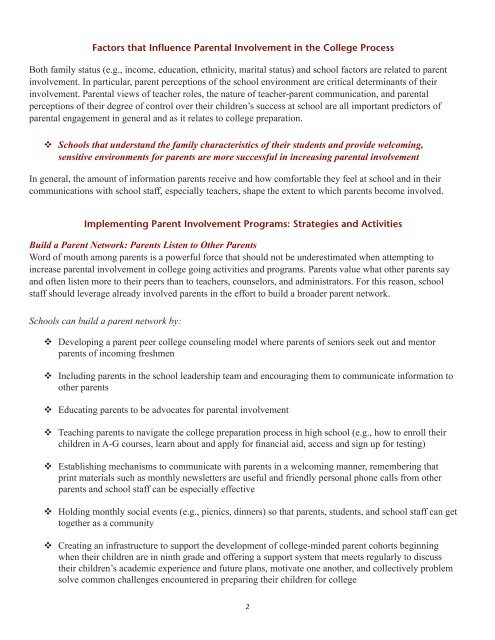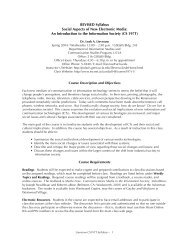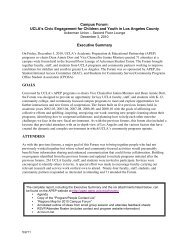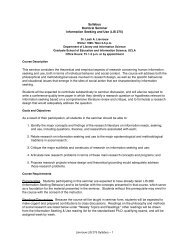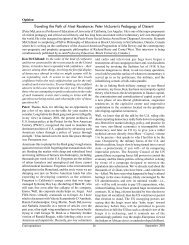A Resource Guide.pdf - UCLA APEP
A Resource Guide.pdf - UCLA APEP
A Resource Guide.pdf - UCLA APEP
Create successful ePaper yourself
Turn your PDF publications into a flip-book with our unique Google optimized e-Paper software.
Factors that Influence Parental Involvement in the College Process<br />
Both family status (e.g., income, education, ethnicity, marital status) and school factors are related to parent<br />
involvement. In particular, parent perceptions of the school environment are critical determinants of their<br />
involvement. Parental views of teacher roles, the nature of teacher-parent communication, and parental<br />
perceptions of their degree of control over their children’s success at school are all important predictors of<br />
parental engagement in general and as it relates to college preparation.<br />
v Schools that understand the family characteristics of their students and provide welcoming,<br />
sensitive environments for parents are more successful in increasing parental involvement<br />
In general, the amount of information parents receive and how comfortable they feel at school and in their<br />
communications with school staff, especially teachers, shape the extent to which parents become involved.<br />
Implementing Parent Involvement Programs: Strategies and Activities<br />
Build a Parent Network: Parents Listen to Other Parents<br />
Word of mouth among parents is a powerful force that should not be underestimated when attempting to<br />
increase parental involvement in college going activities and programs. Parents value what other parents say<br />
and often listen more to their peers than to teachers, counselors, and administrators. For this reason, school<br />
staff should leverage already involved parents in the effort to build a broader parent network.<br />
Schools can build a parent network by:<br />
v Developing a parent peer college counseling model where parents of seniors seek out and mentor<br />
parents of incoming freshmen<br />
v Including parents in the school leadership team and encouraging them to communicate information to<br />
other parents<br />
v Educating parents to be advocates for parental involvement<br />
v Teaching parents to navigate the college preparation process in high school (e.g., how to enroll their<br />
children in A-G courses, learn about and apply for financial aid, access and sign up for testing)<br />
v Establishing mechanisms to communicate with parents in a welcoming manner, remembering that<br />
print materials such as monthly newsletters are useful and friendly personal phone calls from other<br />
parents and school staff can be especially effective<br />
v Holding monthly social events (e.g., picnics, dinners) so that parents, students, and school staff can get<br />
together as a community<br />
v Creating an infrastructure to support the development of college-minded parent cohorts beginning<br />
when their children are in ninth grade and offering a support system that meets regularly to discuss<br />
their children’s academic experience and future plans, motivate one another, and collectively problem<br />
solve common challenges encountered in preparing their children for college


